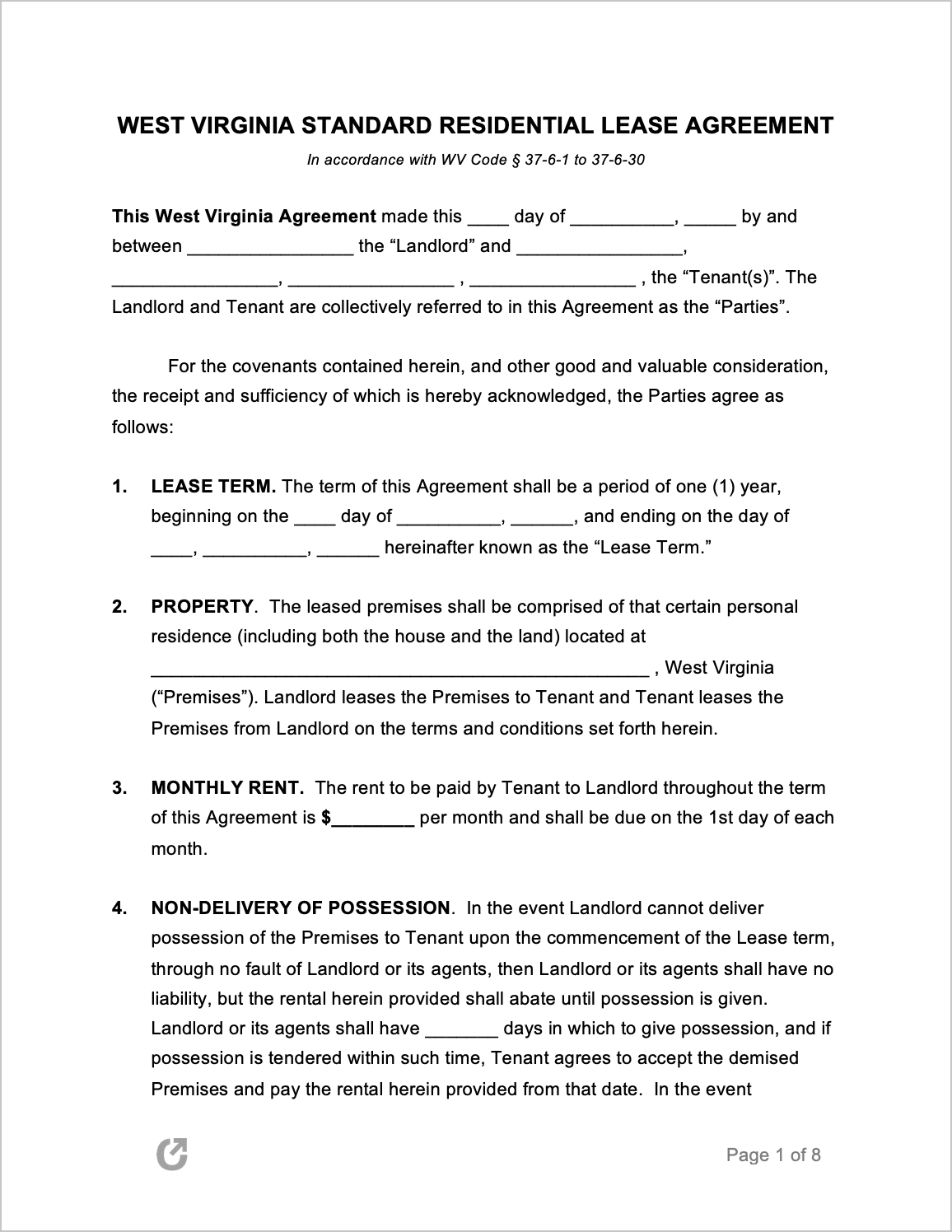West Virginia Rental Lease Agreement Templates
The West Virginia Rental Lease Agreements are legal forms that are used for leasing livable space to rent-paying tenants. With an average lease length of one (1) year, the forms contain the necessary provisions to ensure landlords are protected from unnecessary liability. Once the lessor (owner/manager) and lessee(s) (renting the space) have signed the lease and the landlord has received the security deposit, the tenant(s) can move into the rental.
Unlike other states, West Virginia is among the few that do not limit landlords in the amount they can charge for security deposits. Additionally, landlords are not restricted in the amount of notice they must provide before accessing an occupied rental. Because of WV’s lack of guidance on these subjects, landlords should ensure their leases contain said information.
Types (6)
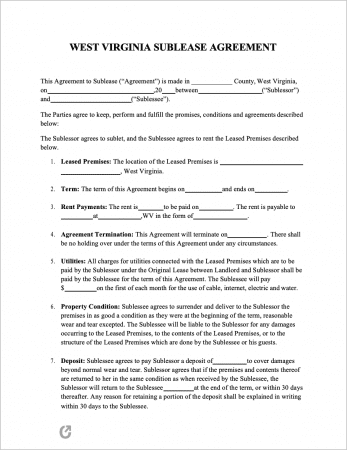 Agreement to Sublease – Used in situations where a tenant can no longer live in their rented space. With the form, the tenant can introduce another tenant (called the “sublessee”) to take their place in the unit, so long the sublessee makes rental payments to the original tenant (to pay to the landlord).
Agreement to Sublease – Used in situations where a tenant can no longer live in their rented space. With the form, the tenant can introduce another tenant (called the “sublessee”) to take their place in the unit, so long the sublessee makes rental payments to the original tenant (to pay to the landlord).
Download – Adobe PDF, Word (.docx)
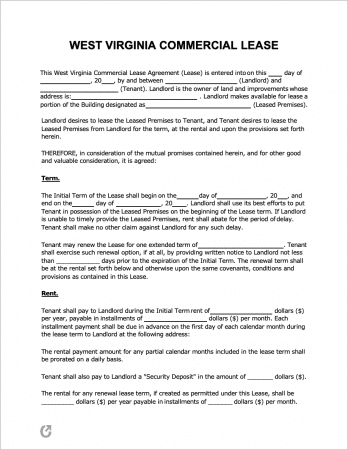 Commercial Lease Agreement – An official document used for establishing terms and conditions pertaining to the renting of a property to be used for business purposes only.
Commercial Lease Agreement – An official document used for establishing terms and conditions pertaining to the renting of a property to be used for business purposes only.
Download – Adobe PDF, Word (.docx)
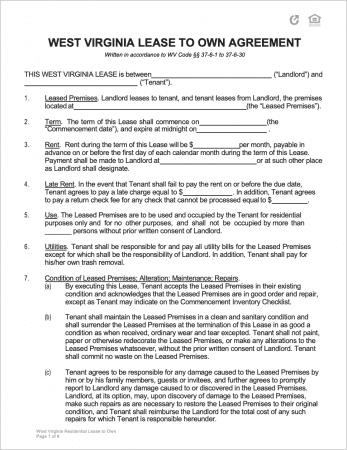 Lease to Own Agreement – Very similar to a standard rental contract, with the exception that it includes provisions to set a purchase price for the rented property. If the tenant(s) wish to make a purchase, they can do so upon the lease’s expiration.
Lease to Own Agreement – Very similar to a standard rental contract, with the exception that it includes provisions to set a purchase price for the rented property. If the tenant(s) wish to make a purchase, they can do so upon the lease’s expiration.
Download – Adobe PDF, Word (.docx)
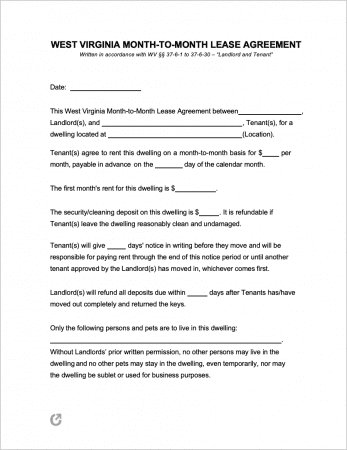 Month-to-Month Lease Agreement – A flexible lease that continues on a monthly basis until either party ends it with a notice of only one (1) payment period. Useful for landlords that lease their own home for part of the year.
Month-to-Month Lease Agreement – A flexible lease that continues on a monthly basis until either party ends it with a notice of only one (1) payment period. Useful for landlords that lease their own home for part of the year.
Download – Adobe PDF, Word (.docx)
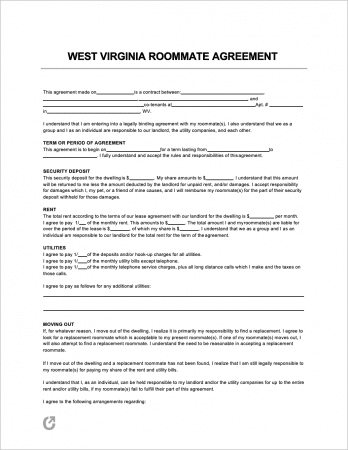 Roommate Agreement – An agreement formed among roommates that lists out the types of behavior that is an isn’t allowed, as well as clarifies responsibilities regarding cleaning, utility payments, rent splitting, and guests (to name a few).
Roommate Agreement – An agreement formed among roommates that lists out the types of behavior that is an isn’t allowed, as well as clarifies responsibilities regarding cleaning, utility payments, rent splitting, and guests (to name a few).
Download – Adobe PDF, Word (.docx)
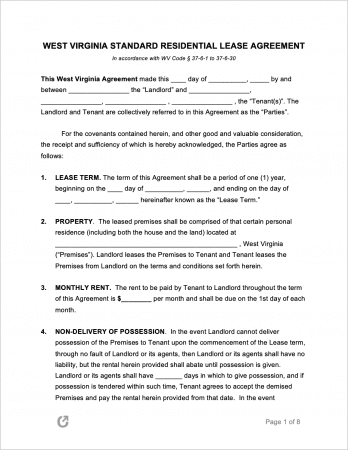 Standard Residential Lease Agreement – The go-to form for landlords that have property they are looking to lease on a yearly basis (or another term as agreed upon by the parties).
Standard Residential Lease Agreement – The go-to form for landlords that have property they are looking to lease on a yearly basis (or another term as agreed upon by the parties).
Download – Adobe PDF, Word (.docx)
What is a West Virginia Lease Agreement?
A West Virginia Lease Agreement is a contract that allows a landlord and tenant(s) to come to terms on an agreement in which a property is leased for a fixed amount of time. For the lease to commence, the parties must agree to abide by the terms contained in the form and sign it legibly. Before a landlord sits down to sign a lease with a tenant, they should have already screened the tenant via an official rental application form.
State Laws & Guides
Laws: Chapter 37 – Real Property
Landlord-Tenant Guides / Handbooks
When is Rent Due?
There is no statute specifying when rent is due. The rental contract should thus clarify the matter of when and where monthly rent should be paid. There is also no statute on grace laws for the late payment of rent.
Landlord’s Access
Emergency: No statute. Federal law permits landlords to enter in an emergency situation. The landlord’s right to enter the property should be clearly stated in the lease to ensure no confusion with tenants.
Non-Emergency: No statute. Landlords should overview entry in the lease. It is recommended that landlords provide tenants with a minimum of twenty-four (24) hours of notice prior to entering.
Landlord’s Duties
As established by § 37-6-30, West Virginia requires all landlords to uphold the following obligations:
- Ensure occupied rental units are kept in a safe and livable condition at all times;
- Maintain that the rental building fully complies with all applicable building, health, safety, and fire codes, unless the code is a direct responsibility of the tenant(s);
- For multi-units, ensure that all common areas are in good condition, are safe to use, and are as clean as reasonable;
- Maintain that all appliances, systems (electrical, plumbing, etc.), and HVAC equipment are in good, safe working order;
- Unless in the direct control of the tenant(s), landlords need to ensure tenants have 24/7 access to running water, reasonable amounts of hot water, and building heat between October 1st and the last day of April; and
- For multi-units, landlords need to provide tenants with easily accessible, sanitary means of garbage disposal.
Required Disclosures
- Lead Paint Disclosure: A landlord who has knowledge of the existence of any lead paint hazards in their rental property built prior to 1978 must declare such hazards to tenants. Further to this, the landlord must furnish the tenant with a copy of the government-issued lead paint safety pamphlet.
- Non-Refundable Fees (§ 37-6A-1(14)): Security deposits must be completely refundable unless both parties expressly agree, in writing (usually in a written rental agreement), that an application fee or pet fee is nonrefundable.
Security Deposits
Maximum: No statute; state law does not specify a cap on the amount a landlord may charge for a security deposit.
Returning to Tenant (§ 37-6A-1): The landlord must return security deposits within sixty (60) after the end of the lease or within forty-five (45) days of the occupation of the rental dwelling by a subsequent tenant, whichever time period is shorter.
If the landlord will retain part or all of the deposit, the landlord must deliver a written itemization of any such damages or other charges, together with the remaining security deposit amount. The security deposit must be returned via personal delivery to the tenant or by mailing the deposit and/or notice to the tenant’s last known address.
Deposit Interest: No statute.
Uses of the Deposit (§ 37-6A-2(b)): Landlords can make the deductions from tenant’s security deposits for the following reasons:
- To cover the cost of missed rent payments and/or late fees;
- To pay for the repair of damage to the property, so long it wasn’t a result of standard wear and tear;
- To pay for unpaid utilities that were the responsibility of the tenant(s) (per the signed lease);
- To pay for the removal and/or storage of the tenant’s property;
- To pay for any other damages that were clearly established as the tenant’s responsibility per the rental contract.
